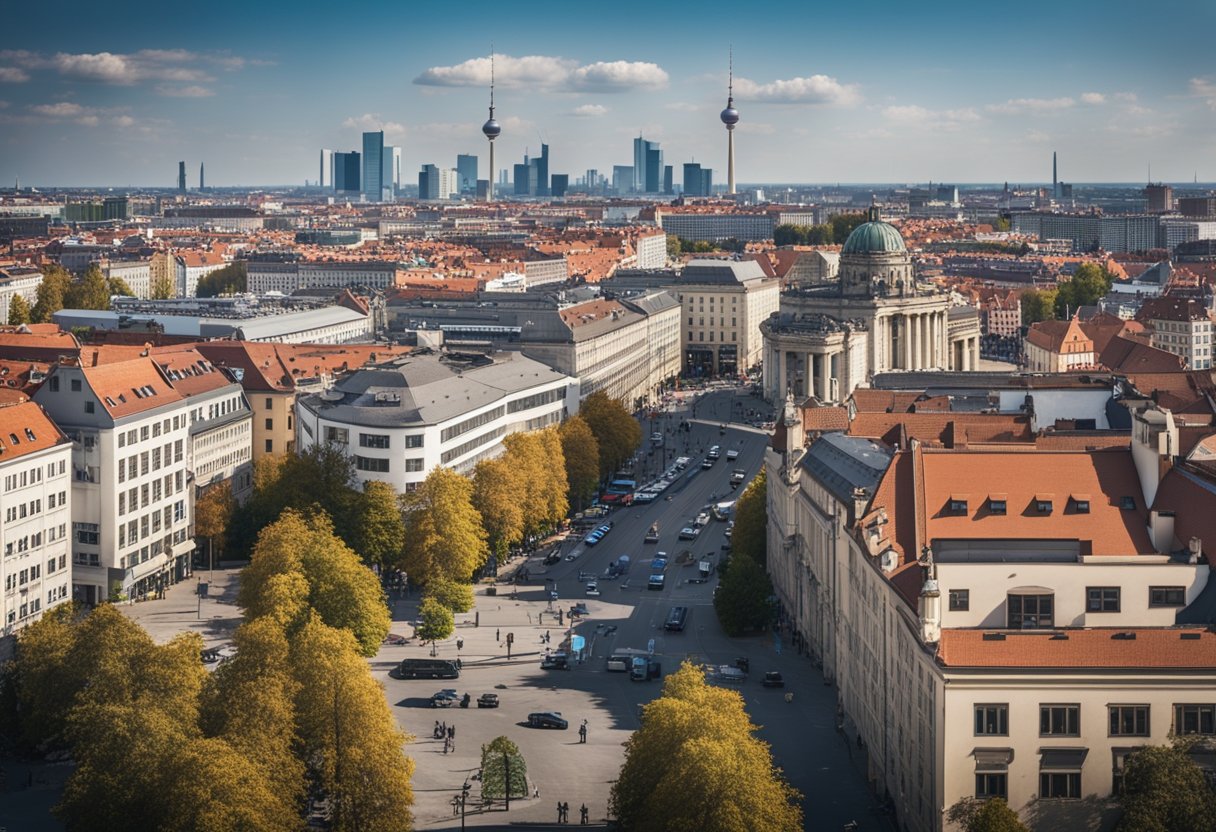Berlin, Germany, boasts a dynamic mix of rich cultural history, vibrant street art, and an extensive variety of culinary delights, making it an attractive destination for expats and residents alike.
However, the cost of living in Berlin city can vary significantly depending on lifestyle, location, and personal needs.
Compared to other major European cities like London or Paris, Berlin is considered more affordable, yet it offers a high quality of life.
Despite its popularity, the city has managed to maintain a lower cost of living index, making it an appealing choice for those looking to relocate.
When evaluating the cost of living in Berlin, it’s essential to consider a range of expenses including housing, which can range from reasonably priced rentals to more expensive options depending on the area.
Daily necessities such as groceries, transportation, and entertainment also play a substantial role in the monthly budget. For a comfortable lifestyle, a single person’s estimated monthly costs are around €2,810 while a family of four may expect expenses closer to €4,920.
These figures suggest that Berlin, while not the cheapest city to live in, balances cost with the benefits of a metropolitan life.
It’s crucial for individuals considering Berlin as their new home or destination for a visit to assess the financial implications carefully.
One must account for not only the visible costs like rent and food but also hidden expenses that come with city living. For example, healthcare, fitness, and other personal items or services that contribute to an individual’s overall expenses and cost of living in Berlin.
Keeping these factors in mind will help form a realistic expectation of the budget needed to enjoy what Berlin has to offer.
General Cost of Living in Berlin
The cost of living in Berlin varies depending on lifestyle and housing choices, with rent being a significant factor in monthly expenses. Here’s an insight into the average costs a resident or newcomer might expect to encounter in various facets of daily life.
Housing and Rent
Rent in Berlin can be considered affordable relative to other major cities in Germany, but prices are rising.
A typical one-bedroom apartment in the city center averages around €1,200 per month, while the same outside the center may cost around €800. An apartment deposit could equal up to three months’ rent.
Utilities
Monthly utilities, including electricity, heating, and water, are approximately €200 for an 85m² apartment. Additionally, residents need to account for an internet subscription and TV tax, which may add up to €50 combined.
Groceries and Food
At local markets, daily essentials like milk, eggs, and bread are affordable, while dining out in restaurants can increase living costs. A liter of milk costs around €0.70, a loaf of bread is about €1.30, and chicken fillets can be found for roughly €7.50 per kilogram.
Transportation
Public transport in Berlin is efficient and relatively budget-friendly. A single one-way ticket for bus, tram, or train is around €3.00, while a monthly pass from BVG could be close to €86. Owning a car can significantly add to expenses, considering fuel, maintenance, and insurance costs.
Healthcare and Insurance
Health insurance is mandatory in Germany, and an average monthly premium for private health insurance starts at about €150. Personal liability insurance is also recommended, which may increase monthly expenses.
Education
Those with children should account for childcare costs or international school fees, which can be substantial. International schools, in particular, may charge tuition fees upwards of €1,000 per month.
Miscellaneous Expenses
Other everyday expenses to consider include a gym membership, which can average around €30 per month, and entertainment costs, such as €10 for a cinema ticket. A pint of domestic beer in Berlin is generally priced at about €3.50, and a bottle of wine starts at €5.
Living in Berlin could be quite manageable or relatively expensive, depending on individual income, lifestyle, and ability to save money.
Employment and Personal Finance
When considering the cost of living in Berlin, understanding the landscape of employment and personal finance is essential.
The city’s economic structure offers diverse opportunities, but staying financially healthy in Berlin necessitates strategic planning and management of income and expenses.
Income Levels and Employment
Berlin boasts a dynamic job market with burgeoning start-up and tech sectors. Freelancers and expats often find Berlin appealing due to relatively lower costs compared to other major European cities.
Average income levels in Berlin can vary widely by industry, with start-up and tech employees often enjoying competitive salaries.
Banking and Savings
In Berlin, having a bank account is fundamental for managing finances. Numerous banks offer services in English, catering to the city’s large expat community.
Savings can also be optimized with various banking products and the German government supports pensions through the Riester-Rente and Rürup-Rente plans.
Cost Management Strategies
Effective cost management in Berlin involves tracking monthly costs encompassing rent, utilities, transport, and groceries.
Budgeting tools can help to maintain a healthy balance between income and expenses. Smart shopping and using cost-effective public transportation options can significantly save money.
Expat Considerations
Expats in Berlin must navigate additional financial needs such as health insurance, which is mandatory in Germany.
Understanding tax obligations and how they impact net income is also critical. The cost of rent can be a significant expense, and expats often utilize housing search platforms catered to their specific needs.
Leisure and Lifestyle
Berlin offers a vibrant array of leisure activities that cater to diverse tastes and budgets, ensuring that its residents and visitors can enjoy a rich cultural life without necessarily having to spend extravagantly.
Entertainment and Recreation
In Berlin, the cost of entertainment and recreation varies widely. The capital boasts an array of cinemas, which generally charge around €10 for a ticket.
For those interested in the arts, there are numerous galleries, with many offering free exhibitions. When it comes to urban leisure memberships, services like the Urban Sports Club provide access to various activities, with prices based on membership tier.
Sports and Fitness
For fitness enthusiasts, Berlin has numerous gym options, from high-end fitness centers to more budget-friendly gyms. Monthly memberships can range from approximately €20 to €70.
Those into racquet sports will find tennis court rentals available at different facilities, with the cost dependent on location and time of day. Prices can vary, but on average, you might expect to pay about €15-€25 per hour.
Dining Out
The city’s restaurant scene offers a variety of choices from inexpensive restaurants to more exclusive mid-range spots.
A meal at an inexpensive restaurant may cost about €9, while a three-course meal for two at a mid-range restaurant averages around €45. Berliners love their coffee, and a cappuccino is priced at about €3.28 on average.
For those enjoying nightlife, the price for a domestic beer in a bar starts at around €3, while an imported beer or a cocktail can be between €3.50 and €8.
Frequently Asked Questions
When it comes to understanding the cost of living in Berlin, potential residents often have questions related to the financial implications for various lifestyles and household configurations.
What are the typical living expenses for a student in Berlin?
For students, cost of living in Berlin can include rent, public transportation, groceries, and leisure activities. On average, a student can expect to spend between €700 to €1,100 monthly, with rent for a room in a shared flat being a significant portion of that budget.
How does the cost of living in Berlin compare for families with children?
Families with children in Berlin may have higher expenses due to the need for larger living spaces and additional costs such as childcare and extracurricular activities for kids. A family can anticipate a monthly cost ranging from around €3,000 to €4,500, depending on their accommodation and lifestyle choices.
What kind of salary is needed to live comfortably in Berlin?
A comfortable living standard in Berlin typically requires a salary that covers housing, utilities, food, health insurance, transportation, and leisure. Individuals should aim for a minimum gross income of €3,000 per month to cover these expenses comfortably.
What is the average cost of rent for different types of housing in Berlin?
The cost of housing varies widely. Generally, a room in a shared apartment may fall between €400 to €900 per month, whereas a private apartment can range from €700 to €1,500 per month, with central locations being on the higher end.
How does the cost of living in Berlin for couples compare to individuals?
Couples may find living in Berlin more budget-friendly per person compared to individuals due to shared expenses. The costs can be split, particularly rent and utilities, making the overall financial requirement less per individual within the couple.
In terms of living expenses, how does Berlin compare to cities in the United States?
Berlin’s living expenses are generally lower compared to major cities in the United States. Costs of living in Berlin include such as healthcare, tuition, and public transportation often prove to be more affordable, although the comparison can vary significantly depending on the US city in question.




